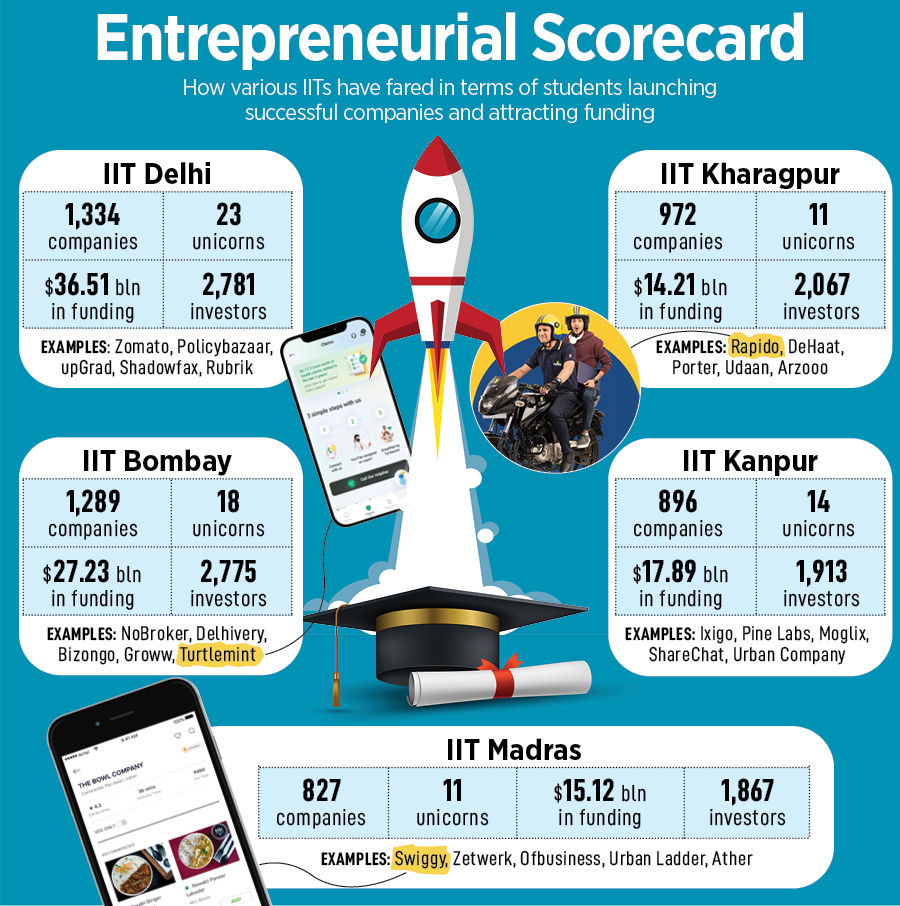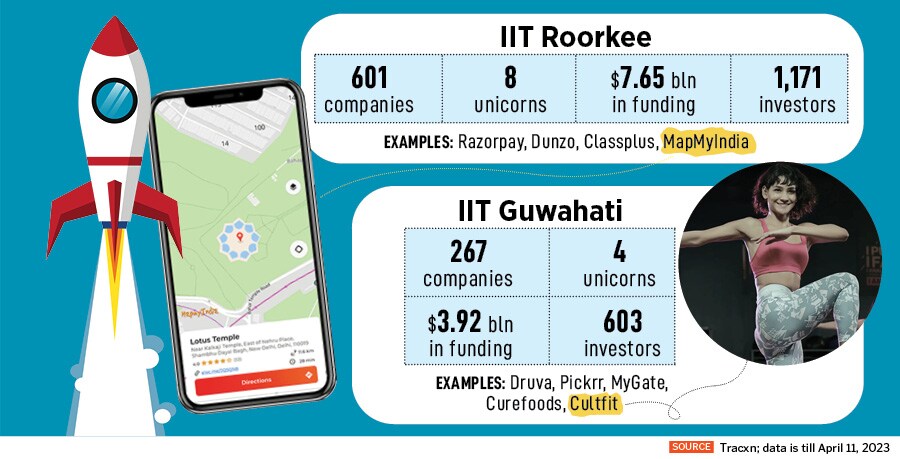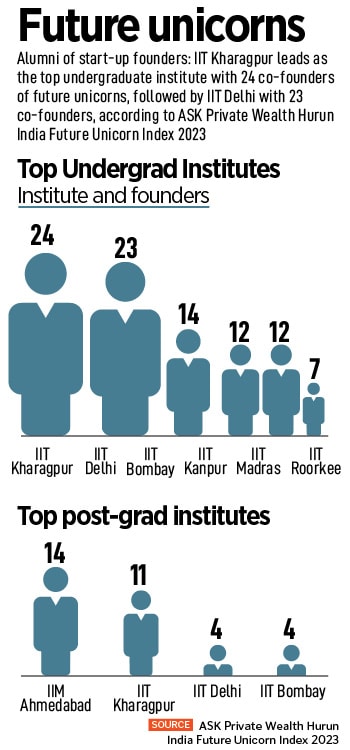Engineers to founders: How IITs are fuelling the startup boom in India
Students from Indian Institutes of Technology are increasingly opting for a startup way of life, while the institutions have been improving their global quality rankings


When Raghav Verma made it to the Indian Institute of Technology [IIT] Delhi in 2005, he had no dreams of becoming an entrepreneur. “There was very little talk or awareness about startups," recalls Verma, who opted for chemical engineering. “Back then, there was no Startup India or Shark Tank," he smiles. What was also conspicuously missing in the IIT campus were vibes around startup hustle and bustle. “All my college years, I had zero aspirations of becoming a founder," he says.
Verma found himself to be an average student in a “group of the smartest and most hard working in the country". His early days at IIT Delhi slowly changed his personality, says Verma, who went on to intern with McKinsey for a few months, and then worked an analyst with Opera Solutions for over two years. “The brilliant peer group [at IIT Delhi] pushed me to become the best version of myself," he says, adding that a brutal assessment of one’s own standing did a world of good for the young student. The exposure to music and other subjects, he underlines, empowered him to adapt to fields outside engineering.
Over a dozen years later, Verma is an entrepreneur, and attributes his success to his alma mater. “I would say who I am today is largely influenced by my time at IIT," he reckons. Two years after finishing his IIT, Verma started his entrepreneurial as co-founder of online education startup PrepSquare in July 2012. A year later, he co-founded tea brand Chaayos. “IIT," he underlines, “gave me the confidence that helped me to start my entrepreneurial journey."

Over the past few years, IITs have consistently seen its students turn entrepreneurs, launching successful companies and also attracting billions of dollars in funding (see ‘Entrepreneurial Scorecard’). At the same time, the institutions have been improving their ranking at a global scale. IIT Bombay, whose alumnus has launched startups like Groww, Turtlemint and Delhivery, has recently become the first Indian institute to be in the top 150 of QS World University Rankings 2024. In fact, 11 IITs and 45 Indian institutes made it to the annual international university rankings this year.

According to the ASK Private Wealth Hurun India Future Unicorn Index 2023, India is home to 83 unicorns, 51 gazelles (companies set to be unicorns in three years) and 96 cheetahs (likely to turn unicorns in five years). Most of the co-founders of future unicorns on this list, 92 to be precise, are IIT graduates.

IITs are more than knowledge, conviction and confidence boosters. They are the Red Bulls" that “give you wings to fly," says Shikhar Sachan, who graduated from IIT Guwahati, joined IBM in 2009, and worked for three years. Sachan explains what ‘Red Bull’ is and how it works. Most of the startup journey gets nipped in the bud because of the absence of the first cheque. “IITians are that first cheque. They are Red Bulls," says the co-founder of Civilsdaily, a Delhi-based government test prep platform, adding that a strong alum network helps to get angel investors on board.
Meanwhile, in Bengaluru, Shruti explains how the entrepreneurial ecosystem at IITs is thriving largely due to unwavering support and resources provided by the alumni. The co-founder of ApnaKlub, a B2B wholesale platform for FMCG, starts with the ‘inspiration’ angle. The IITians who made it big in the entrepreneurial world, she underlines, are not only the early pioneers but also set an example. They worked tirelessly, gained remarkable success and visibility. “Their achievements serve as both aspiration and reality, igniting the belief that we too can accomplish great things," says Shruti, who doesn’t use a second name and is an alumnus of IIT Delhi.
 A strong alumni network indeed is one of the biggest pluses of having an IIT badge. With their continuous support, Shruti lets on, including angel investments and guidance in areas such as hiring, managing co-founder dynamics and providing free workspaces, alumni make a tangible difference. “The remarkable aspect is that they are willing to recommend and assist even if they haven"t directly worked with you," she says. “I am immensely grateful to be part of this network, and I am excited to pay it forward," she adds.
A strong alumni network indeed is one of the biggest pluses of having an IIT badge. With their continuous support, Shruti lets on, including angel investments and guidance in areas such as hiring, managing co-founder dynamics and providing free workspaces, alumni make a tangible difference. “The remarkable aspect is that they are willing to recommend and assist even if they haven"t directly worked with you," she says. “I am immensely grateful to be part of this network, and I am excited to pay it forward," she adds.
The IIT tag doesn’t just help you in starting up, but also during the course of your entrepreneurship journey. Sachan tells us how. During the initial days of entrepreneurship, he says, there are hardly any meaningful numbers to look at so that one can assess a venture and the health of the business. In such a scenario, it"s obvious that venture capitalists (VCs) will look for someone who they are familiar with. “They will try to reduce your "unknowns," he says, adding that there is a lot of subjectivity when one tries to assess if entrepreneurs have the best understanding of the problem. “Familiarity becomes important. In many ways, it’s similar to selecting a CXO. There is no open exam for that," he smiles.
A VC in Mumbai also agrees that IITs have emerged as the breeding ground for founders. “They foster a culture of innovation, resilience, and unwavering determination," reckons Vikram Gupta, founder and managing partner at IvyCap Ventures. The entrance examinations, particularly the JEE, serve as a robust filter that identifies individuals with remarkable qualities of perseverance, tenacity, and an unyielding work ethic.
 These traits, Gupta explains, are not only essential for thriving in adversity, but also form the bedrock of an entrepreneurial mindset. The IITs" emphasis on practical learning, interdisciplinary approach, and exposure to cutting-edge technologies equips budding entrepreneurs with the tools and knowledge required to translate ideas into successful ventures. Moreover, several IITs have established exclusive entrepreneurship cells and incubation centres, serving as valuable platforms for aspiring entrepreneurs. These entities, he points out, offer comprehensive support, including mentorship, guidance, networking avenues, and abundant resources to foster the growth of startup concepts.
These traits, Gupta explains, are not only essential for thriving in adversity, but also form the bedrock of an entrepreneurial mindset. The IITs" emphasis on practical learning, interdisciplinary approach, and exposure to cutting-edge technologies equips budding entrepreneurs with the tools and knowledge required to translate ideas into successful ventures. Moreover, several IITs have established exclusive entrepreneurship cells and incubation centres, serving as valuable platforms for aspiring entrepreneurs. These entities, he points out, offer comprehensive support, including mentorship, guidance, networking avenues, and abundant resources to foster the growth of startup concepts.
“Our investment philosophy is deeply rooted in leveraging the collective wisdom and collaborative spirit of the IIT alumni network," says Gupta, adding that his VC fund actively hunts for exceptional individuals who embody the entrepreneurial spirit, demonstrating not only the necessary technical acumen but also the passion, creativity, and adaptability to navigate the ever-evolving business landscape. IITs, the VC points out, provide a world-class education.

An IIT tag, however, is no guarantee for success. “It is not like an IIT education guarantees success to everyone," says Verma of Chaayos. A startup, he underlines, requires a different level of commitment and aptitude that is not automatically present in everyone who goes to an IIT. Sachan, meanwhile, points out another flip side of the ‘funding bias.’
The primary issue, he reckons, is not whether more IITians get funded. With just a few Tier-I and Tier-II VC firms, the third company in a specific domain finds it impossible to raise funds. “In the valley, so many companies chasing similar ideas get funded," he says. “We don’t want folks saying we had better execution but not enough to fight a VC-backed competitor," he says, adding that in the long run, it takes more than tags, funding and valuation to emerge as a winner. “In the end, what matters is how you play with the cards you are dealt with," says Sachan. “IIT is one of the cards, and not the only card."
First Published: Jul 03, 2023, 15:37
Subscribe Now